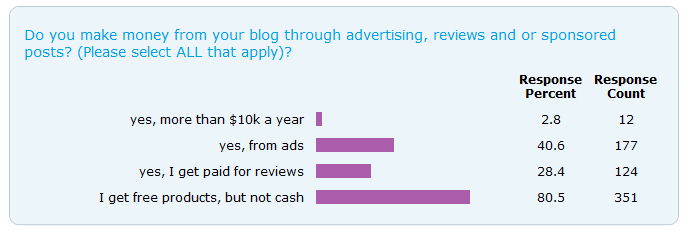 Does it mean you are a bad mom if you want your business to be successful? Does it make you a {witch} to desire success? I work with two groups of moms – mom bloggers and mom inventor/entrepreneurs. Both groups – IN GENERAL – struggle to bring income in that matches the effort they put in to their businesses. Intrigued by the general “failure” rate of mom businesses (and small business in general), I did a little research. I ran two anonymous surveys: one for mom bloggers and one for mom inventor/entrepreneurs. The results made me wonder what women are in business for… if not money.
Does it mean you are a bad mom if you want your business to be successful? Does it make you a {witch} to desire success? I work with two groups of moms – mom bloggers and mom inventor/entrepreneurs. Both groups – IN GENERAL – struggle to bring income in that matches the effort they put in to their businesses. Intrigued by the general “failure” rate of mom businesses (and small business in general), I did a little research. I ran two anonymous surveys: one for mom bloggers and one for mom inventor/entrepreneurs. The results made me wonder what women are in business for… if not money.
Last week I wrote about corporations destroying the mom bloggers market by creating an economy based on blog traffic. Several bloggers voiced that they were never in it for the money. That explains a lot. But, why is there so much talk about whether or not bloggers should be compensating and about how to increase traffic to increase opportunities? Some mom bloggers are trying to earn some income, but very few are. Only 2.8% of the 436 bloggers surveyed make over $10k a year.

At least that’s consistent with the responses to the question, “What is the main reason you have a blog?” We took the text answers and ran them through a word graph app. Here are the results:
As you can see, “money” was not mentioned much in comparison to “life, family, reviews” and “share”. The words “business” and “income” are almost impossible to see.
This is a little confusing to me. I see moms working hours every day on their blogs. They are the same women who responded to the survey. If they are just in it to “share”, is it worth so much time? Why do they care if their traffic is high enough to “qualify” for opportunities? Or, are some moms not comfortable saying they *want* income and this *is* a business? Perhaps they don’t know how to turn their passion into a business (like blogging for a company, being a virtual assistant, social media manager or journalist).
The inconsistencies deepen with the mom inventors and entrepreneurs. More than half of the moms surveyed work on their business full-time. Full-time, means it’s not just about “sharing” or a hobby, right? Then why are only 2 of the 59 respondents getting a salary? Sure, many are also reinvesting, but over a quarter of them couldn’t take the money out if they wanted to:
Business is about money and success for business means being able to afford to get paid. Almost everyone agreed with that, and some have even higher aspirations.
Like last week’s discussion, it comes down to knowing who you are and what you want. There are at least three different kinds of businesses in the mom entrepreneur product business:
- The “lifestyle” business. These women created a product, ramped up slowly and planned to be profitable early. They wanted to make money – whether it is a part-time income or nice nest egg. Usually they were looking for an income that would allow them to be home more with their children. They invested moderately if at all. Some do well, some don’t. Most discovered a product they were passionate about – a solution to a problem or product that made them happy. Many review bloggers follow a similar plan and earn a little income or get nice products to review.
- The “big win” business. These women had an idea they had to pursue. They researched, filed patents, and invested heavily. Some learned quickly that it would NOT be an overnight success. But, these women don’t hide the fact that they invested, thinking there was potential. They sometimes hide their intentions by putting the focus on their motivation (not their goal). Women in business are often motivated by creating something that will serve a greater purpose. They want to get their products made so other moms will have access to the solution they needed. That’s great motivation, but not a business goal. If your goal is to get a product in hands of others, you could post the idea in various places on the web and let a large company make it. If you patented your product, you are trying to prevent that, right? The goal is profit.
- The “vanity” business. (This will get me in trouble, but I have to share this.) These women may have started with one of the other business models in mind, but somewhere along the way, they shifted focus. Some started out just wanting to be “in business”. Vanity does not have to be a bad thing. In the book world, there are “Vanity Publishers” who help people become authors by charging them to print their books. Sometimes that leads to becoming a big author. It’s the “fake it ’til you make it” model. It can work for small businesses. You can pay for press, hype, advertising, professional websites, quality packaging, and other elements of a successful business. It doesn’t mean you will be a success, but you’ll look like one. The problem is when the business owner stops trying to make a real business. They think they are successful because everyone congratulates them — despite the lack of revenue or profits.
 Perhaps women fall into the “vanity” business category too easily. Our need for external validation is difficult to overcome. We feel like we’re failing because orders aren’t coming in, so we look for the ‘feel good’ opportunities – the quick fixes. They don’t make business sense, but they make you look like a success. You can buy fans (yes, hundreds of FB fans for just $5 on fiverr.com), press, awards, even customers, but you can’t buy the one thing that makes a business a financial success. Anything can be bought, except for profits. Profits come from sales. Sales come from asking your customers to buy your products, not from asking your friends to compliment your product, like your Facebook fan page, or vote for you in a business competition.
Perhaps women fall into the “vanity” business category too easily. Our need for external validation is difficult to overcome. We feel like we’re failing because orders aren’t coming in, so we look for the ‘feel good’ opportunities – the quick fixes. They don’t make business sense, but they make you look like a success. You can buy fans (yes, hundreds of FB fans for just $5 on fiverr.com), press, awards, even customers, but you can’t buy the one thing that makes a business a financial success. Anything can be bought, except for profits. Profits come from sales. Sales come from asking your customers to buy your products, not from asking your friends to compliment your product, like your Facebook fan page, or vote for you in a business competition.
The real problem is that many women are afraid to say they want to make money. Instead, I hear, “I blog for fun.” Or, “I started my business because I want other moms to have this solution I invented.” But, it’s okay to do both. You should love your job. Having a passion for your product is admirable. Have confidence in what you’ve created. You don’t have to give product or time away for free or discount it to prove there is a higher purpose in what you are doing.
One of the most startling experiences I’ve had since running my own business came when I went to meet a man for coffee. A mutual business associate told me I should talk to him about my business, so I emailed him and he invited me for coffee. I knew he was an author and worked with local startups, so I thought it was a free info-sharing session. Less than ten minutes into the conversations, he asked me, “You aren’t here to pay me $7000 to do an analysis, are you?” Uh, no. It was awkward for me, but at least expectations were clear. He was there to sell me something. He even sent me a proposal later, asking for the business. That’s how most men view their businesses – in numbers, with a clear goal.
If you are in business to earn an income or make millions, stay true to that focus on income. Don’t look for outward validation, look for sales. If your sales are poor, don’t seek a quick fix; an award, press mention or a few fans won’t necessarily help. Instead, think about what you have to offer, who needs what you have, and how to reach them. Then ask for the sale. Ask for money. That’s what business is.


